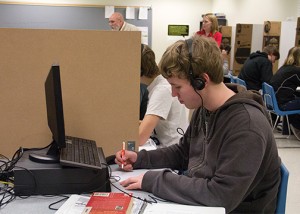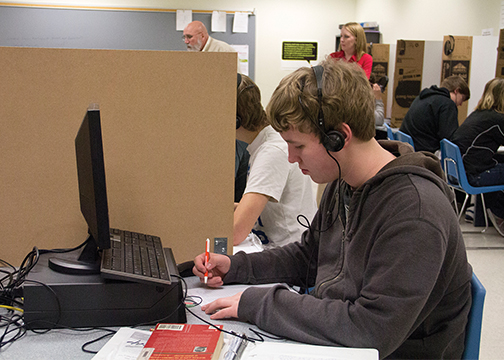
By Kelly Doran
Sun staff
When Stephen Smith talks to teenagers about Internet safety, what he stresses to his audience is privacy.
Many people don’t understand how much private information they provide in their daily lives, said Smith, who is the director of educational leadership for Cincinnati Bell.
If someone has the right kind of software, that person can find a great deal of information about someone else’s likes and dislikes based off of what someone does online, Smith said. For example, many teenagers do not think to change their privacy settings on social media to at least ‘friends only’.
“If teenagers understand privacy, they would be much less likely to take an inappropriate photo and send it to someone or to cyber bully someone,” Smith said. He added that when teenagers are applying to college or later applying to a job, past posts or photos can ruin their chances.
“You’ll be judged by the way you portray yourself on social media and sometimes how your friends portray themselves,” Smith said.
The beginnings of cyberbullying and sexting usually start when a student goes into 6th grade, Smith said. At that age, student’s brains are not totally formed and so they tend to do things that are impulsive and that do not necessarily make sense, he said.
“Once it’s out, it’s out and certainly those things can’t be taken back once it goes viral,” said Kent Arter, Milford High School resource officer and Miami Township Police officer.
About three quarters of teenagers do not lock their security settings down, which seems like an opportunity for more people to see them and let them feel like a part of a community. But Smith said that leaves them open to identify theft.
Cyberbullying has also been an issue in schools, Smith said. He has visited many schools talking to students and has not been to a single school that has not had at least one issue.
“Cyberbullying stays with you as long as you have your device with you,” Smith said. At any given time about 10 percent of teenagers are suffering from depression and anxiety and if those teenagers are being cyberbullied they are five times more likely to hurt themselves or commit suicide, he said.
At the end of every presentation Smith gives to students, he tells them to take five seconds to consider the consequences and ask if a college will see this, if it will hurt the student in the future and if the person they are communicating with will be okay with it.
One case that Smith dealt with involved a sixth-grade girl taking a naked photo of herself that she sent to one boy. The photo spread around the school and everyone later deleted it, Smith said. However, when the girl was a sophomore in high school, the photo appeared again.
Smith presents to students and parents as part of Cincinnati Bell’s Responsible Technology Series. He has spoken to over 140,000 over the past four years, he said. Smith tries to show students how easy it is to find personal information on the Internet and the consequences of things they post.
One of the schools Smith presents at is Williamsburg Local Schools, said High School Principal Heather Powell. Williamsburg does not have major issues with Internet safety, but the school is also proactive.
“Being a small school we generally know what’s going on most of the time,” Powell said. Smith gives a presentation to parents and students at Williamsburg.
Throughout the year, Williamsburg teachers do mini presentations about Internet safety that are more informal, Powell said. Technology is ever changing and the teachers have to always be willing to learn something new because students are.
In addition, middle school students learn about the dangers of social media in Williamsburg’s Teen Against Bullying program. Powell believes that part of the reason Williamsburg has not had many issues is that the topic is addressed beginning in sixth grade.
When Williamsburg students have problems, it typically has to do with posting pictures or saying things they shouldn’t, Powell said.
“The best resource is making sure you have that parental involvement,” Powell said.
Arter has found that many parents do not know their childrens’ passwords and so do not have accessibility.
He presents to seventh and eighth grade students about responsible social media use and what crosses the line. It is important for parents to have as much control over devices as their children, Arter said.
Many Internet safety issues Arter sees have to deal with teenagers taking photos of their house with the address, taking pictures of their car with the license plate or putting photos of their license online.
Some smart phones have location services and if location services are turned on and someone takes a photo on that phone, there is technology that will figure out where the photo was taken, Arter said. He recommends smart phone users turn location services off when taking photos.
Justin Clark, a junior at Williamsburg High School, said he keeps everything on his social media accounts private and tries not to post too much. Clark, who prefers Twitter, said he will not post photos of his family.
Many law enforcement agencies have officers with experience dealing with potential crimes involving social media. Parents are encouraged to contact their local law enforcement agency if they feel their child has been a victim.

